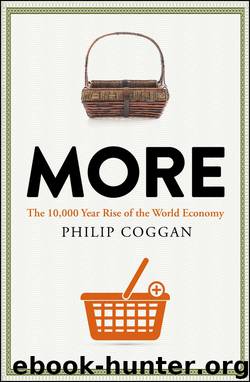More by Philip Coggan

Author:Philip Coggan
Language: eng
Format: epub, azw3
Publisher: Profile
Published: 2019-02-18T16:00:00+00:00
The box that contains multitudes
A trucking magnate also helped change the nature of international trade after the Second World War with a simple innovation: a standard metal container. Without it, the ports of Felixstowe and Singapore, featured at the start of this book, could not operate anything like as efficiently. The old docks operated in a rough-and-ready fashion. Goods were placed in the hold in a higgledy-piggledy fashion and unloaded again in the same way. It might take a week or more for the ship to be offloaded.
A job as a docker (or stevedore) was highly prized. But the work was dangerous and insecure; the men lined up at the gates each day looking for employment. In addition, labour relations were poor and strikes were common: dockers’ wages could eat up half the costs of an ocean voyage.48 Indeed, an academic study found that “the handling of cargo was almost as labour-intensive after World War II as it was during the beginning of the Victorian Age”.49
In the 1950s, a businessman called Malcom McLean tried to tackle the inefficiencies of the industry. He wanted the containers carried on his company’s trucks to be loaded straight on to ships. But this required wholesale changes in the design of ships, the operation of docks, and the working conditions of dockers; something that was bound to be opposed by the unions. So he established a new port in Newark, New Jersey, on the other side of the river from Manhattan. On April 26th 1956, the first container ship, SS Ideal-X, set off for Houston, Texas. Cranes that could lift the boxes on and off the redesigned ships had to be installed. And agreement was needed on a standard for container size. Initially, this was based on a 20-foot-long box called a TEU (twenty-foot equivalent unit) although modern boxes tend to be 40 foot long (or 2 TEUs).
It was not until the mid-1960s that containerisation really took off. The Vietnam War gave the process a boost since the US military found that using the metal boxes cut their transport costs in half. The long-term savings in shipping costs were even greater, from $5.86 a ton to 16 cents. In addition, ships were unloaded in less than a day, reducing idle time. Petty theft fell sharply, cutting insurance costs, and container ships required fewer crew to operate them. In the decade after 1966, international trade in manufactured goods grew at more than double the pace of either manufacturing output or global GDP.50 Some people estimate that the container was more influential than international agreements on tariff reduction in increasing global trade in the second half of the 20th century. Indeed, analysis suggests that trade between developed-world countries that adopted containers rose almost ninefold over a 20-year period.51
Unions fought a rearguard action against the shift but they were bypassed. The port of Felixstowe owed its rapid rise to a union ban on containers in London ports. In turn, this meant that manufacturing companies moved, since they no longer needed to rent expensive space in big cities in order to be near the docks.
Download
This site does not store any files on its server. We only index and link to content provided by other sites. Please contact the content providers to delete copyright contents if any and email us, we'll remove relevant links or contents immediately.
International Integration of the Brazilian Economy by Elias C. Grivoyannis(108411)
The Radium Girls by Kate Moore(12012)
Turbulence by E. J. Noyes(8039)
Nudge - Improving Decisions about Health, Wealth, and Happiness by Thaler Sunstein(7689)
The Black Swan by Nassim Nicholas Taleb(7101)
Rich Dad Poor Dad by Robert T. Kiyosaki(6600)
Pioneering Portfolio Management by David F. Swensen(6280)
Man-made Catastrophes and Risk Information Concealment by Dmitry Chernov & Didier Sornette(6001)
Zero to One by Peter Thiel(5782)
Secrecy World by Jake Bernstein(4738)
Millionaire: The Philanderer, Gambler, and Duelist Who Invented Modern Finance by Janet Gleeson(4460)
The Age of Surveillance Capitalism by Shoshana Zuboff(4273)
Skin in the Game by Nassim Nicholas Taleb(4232)
The Money Culture by Michael Lewis(4188)
Bullshit Jobs by David Graeber(4177)
Skin in the Game: Hidden Asymmetries in Daily Life by Nassim Nicholas Taleb(3986)
The Dhandho Investor by Mohnish Pabrai(3756)
The Wisdom of Finance by Mihir Desai(3726)
Blockchain Basics by Daniel Drescher(3571)
